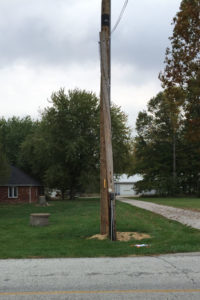Challenge
Mundell was contracted to assess the susceptibility of private drinking water wells to pentachlorophenol (PCP) impacts and to determine a solution to the impacts. Old wood utility poles along a stretch of road in the study area were replaced with new wood poles, which were treated with PCP, a chlorinated herbicide that protects against wood rot. The area is semi-rural and residences in the area utilize private shallow dug wells for their water supply.
Action
Mundell devised a procedure for assessing the susceptibility of local private water wells to PCP impacts from the new utility poles. This approach combined field surveying with an understanding of regional and local geology and hydrogeology and information sourced from the IDNR Division of Water. Several wells within the study area were identified as being potentially at risk for PCP contamination. Subsequent sampling identified two drinking water wells as having been impacted with PCP sourced from newly-installed wood utility poles. Mundell interacted with the client, residents and IDEM to manage the investigation and ongoing well monitoring.
Results
The new wood poles at the two residences were removed and granular activated carbon filtration units were installed at each house to ensure clean water was provided to residents. The impacted wells were placed under quarterly monitoring to observe whether PCP concentrations would attenuate naturally. One of the wells exhibited attenuation of PCP concentrations, dropping to non-detect in several months. The second well exhibited persistent PCP contamination that appeared to vary in concentration with rainfall events. Examination of the well revealed sediment was entering the annular space of the well. Analysis of this sediment indicated that it was impacted with PCP, and most likely contributing to PCP concentrations in the well water.
Mundell researched several options for this residence, including continuation of monitoring until PCP levels fell below screening level consistently, hook-up to municipal water (economically prohibitive), a replacement well in bedrock (rejected due to arsenic occurrence in bedrock water) or a shallow replacement well installed on a portion of the property not impacted with PCP. After consultation with the client and homeowner, continued quarterly monitoring was chosen as the path forward. Monitoring continued until 8 quarters of sample data below the drinking water screening level was acquired, after which Mundell submitted a closure request to IDEM. A No Further Action letter was received from IDEM, successfully closing the site.




